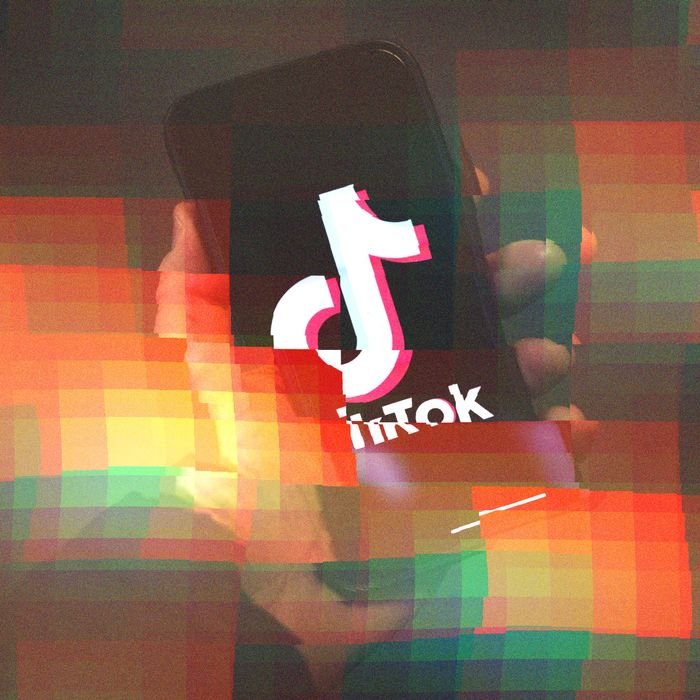
Last chance to see?
Photo-Illustration: Intelligencer; Photo: Getty Images
Last week, in a party vote, the Republican-controlled House Foreign Affairs Committee voted to advance a bill that would give President Biden the authority to sanction or ban TikTok. Over the weekend, Democratic Senator Mark Warner announced that, in cooperation with Republican John Thune, he would introduce a similar measure in the Senate.
This sudden leap to a blanket ban on the platform follows years of debate over how to handle the rise of the wildly popular Chinese-owned platform which, since its sudden outburst in 2018, has been beating its American rivals at their own game. It would be unprecedented. It could also throw the tech industry into chaos.
A complete ban faces some political hurdles. Republicans are united in their calls for a blanket ban on TikTok, which House Committee Chairman Michael McCaul has described as like a spy balloon in your phone. (Rep. Mike Gallagher of Wisconsin opted for digital fentanyl.) Democrats are more divided on strategy. Some are receptive to a ban but not This type of prohibition; others, including Elizabeth Warren, have suggested dealing with TikTok through broader industry-wide regulation. Most are following the Biden administration’s lead, deferring to an ongoing investigation into TikTok’s operations by the US Foreign Investment Committee.
Still, it’s worth thinking about what TikTok’s sudden disappearance would actually mean. Since Donald Trumps thwarted 2020 attempts to shut down the app and then force its sale to an American company, pressure to do so something continued to grow; the prospect has become more, not less, realistic since he left office. Numerous states have instituted their own partial bans, limiting the use of TikTok on government hardware and in colleges. Last week, the Biden administration announced that federal agencies had 30 days to remove TikTok from government devices; the US military has banned the app for years. Similar limited bans exist in parts of Europe and Canada; in 2020, as part of a broad crackdown on Chinese-owned online services, India banned the app outright. TikTok, whose parent company, ByteDance, is based in Beijing, is already friendless in Washington, D.C. A more credible attempt at a ban is only a major international incident, or presidential election, away.
The main driving factor in the push to ban TikTok is Chinese ownership of the apps and its alleged ties to the Chinese government is, in this perspective, a national security story. But the larger case mounted against TikTok is a familiar one. It is a soliciting social media app AND collects content and personal information from millions of daily American users who use the app on devices that collect and share information about their location and other habits. These same users are obviously somewhat influenced by the content they encounter on the app, which feeds them videos through an opaque system. It is loved by many of its users for whom it is an unparalleled connection to the wider culture. For others, it’s a nightmarish place filled with conspiracies, disturbing content, and various mental health harms; for the significant few, it is a source of employment and a place to quickly find a large audience. Mostly, really, it’s a way for people to hang out on their phones. It’s a wholly disturbingly attractive vision of the commons, a huge profit-driven enclosure built around jaw-dropping intervals of human interaction for the purpose of selling ads, which is to say, apart from the ownership issue, it’s fundamentally indistinguishable from Facebook, Instagram, Snapchat and Twitter, from which it has been ruthlessly stealing users since 2018 and which, in return, has shamelessly copied its main features to no avail.
TikTok’s alleged ties to the Chinese government are serious business, but even here the line between TikTok and its domestic competitors isn’t as sharp as it might seem the kind of data that TikTok could collect and theoretically transmit to the Chinese government. available for acquisition through a variety of lightly regulated data brokers courtesy of American technology companies. (The loudest voices against a possible ban are outside the government and mostly about speech and precedent: The ACLU spoke out against the House bill on grounds of constitutionality; progressive group Fight for the Future say considers futile and harmful and instead argues for comprehensive regulation of social media privacy.)
However, a ban holds obvious appeal for lawmakers. The primary concern on TikTok that its parent company is subject to security laws in China that could force it to share user data with the government is credible and has been confirmed by investigative reports. Public opinion on the influence of social media in general has soured somewhat and taking action against TikTok represents a narratively and legally easier option to take action something on the influence of big tech, at least with respect to a bottom-up regulatory approach. Taking aggressive action against American social media companies would be legally complicated and politically burdensome; TikTok’s connections to an already-sanctioned government make the crusade against it easier to compartmentalize as part of a trade war, or as an exceptional internal relations matter, rather than the sort of thing similar American tech companies would otherwise have to worry about. .
In practice, however, a ban would be a strange and alien experience for American Internet users: An important part of their daily digital routines is simply erased from their phones or, at least, made much more difficult to access.
The American tech industry would also enter uncharted territory. The Chinese government’s approach to the Internet has been censorious from the start. However, it was accompanied by an aggressive industry policy intended to promote a local Internet and technology industry, which eventually led to successful companies such as ByteDance. A TikTok ban would be an awkward step in a similar direction. It could open the door for a local TikTok competitor or pave the way for a different kind of successor, whatever it looks like. (Twitter likely provided an opening for TikTok when it killed off Vine, a struggling short-form video app that peaked at 100 million users, in 2016.) The downstream effects on commerce and politics would be immediate, important, and no easier to predict than TikTok is now (the influence of apps on the American music industry alone was impossible to miss). Countless jobs adjacent to social media would be changed in an instant. Some would disappear altogether.
The aftermath only gets weirder from there. Banning TikTok would work like a piecemeal industrial policy. It could bolster America’s tech behemoths, many of which are already under federal government antitrust scrutiny in obvious ways. TikTok’s success has come at the expense of Metas and has already plunged the company into an existential as well as more subtle crisis: Temu and Shein, two Chinese-owned e-commerce companies that pose the first credible threat to Amazon in years, owe much of their success to TikTok promotion and would struggle without it. It could be a great day, in short, for the domestic companies with which many of the same politicians eager to ban TikTok have also been at war.
Or maybe not? Critics and lawmakers with a narrow focus on espionage and digital espionage tend to downplay or even fail to understand how central TikTok has become to the American internet and culture at large. It’s the envy of all its American competitors in almost every way, and while its demise could free up some advertising budgets for Meta, Google and Twitter to recoup, and could certainly create new opportunities for some of them, it could just as easily score an abrupt departure from a certain type of social media company. From the beginning, TikTok has succeeded by taking a maximalist approach to an already dominant style of social media. They were Facebook, Instagram, Vine, Twitter and Snapchat, but Moreover and with less shame a combination of every known engagement strategy and addictive characteristic in a product so unabashedly aggressive and addictive that it defies criticism. His peers have spent the last five years chasing him and failing to catch him, often losing their identities, as well as their most active users, in the process. The success of TikTok sucked the life out of the latest era of American social media companies, which were already showing their age, and left some of their products unrecognizable and creepy. What TikTok users are left with, should it disappear, is a collection of platforms that have been completely reconfigured around TikTok’s existence; her disappearance, rather than saving them, may reveal how completely lost they are.
A TikTok ban, above all, would make for an incredibly strange day on the internet, the sort of thing that would seem implausible to American internet users even as it was happening. It is very likely that, among other possibilities, a forced sale to an American company, just like what happened to the dating app Grindr in 2020, cannot meet the needs of lawmakers without provoking so much backlash. But don’t assume it can’t.
#TikTok #ban #incredibly #strange #day #internet
Image Source : nymag.com
